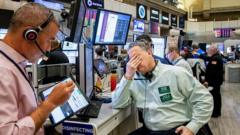Amid the implementation of significant tariffs by former President Donald Trump, investor confidence in U.S. government bonds plummets, resulting in a notable hike in borrowing costs and spurring talks of potential Federal Reserve intervention.
**US Government Debt Faces Turmoil as Trump Tariffs Take Effect**

**US Government Debt Faces Turmoil as Trump Tariffs Take Effect**
Concerns over escalating trade tensions drive investors away from US bonds amid rising interest rates.
As the tariffs on imports from around 60 countries went into effect at midnight, confidence in the U.S. economy has faltered, leading to a substantial sell-off in government debt. The interest yield on U.S. bonds, typically viewed as safe investments during economic downturns, surged dramatically to 4.5%, the highest since February. This escalation is a response to the intensifying trade war, particularly following a harsh 104% tariff on Chinese goods, which prompted Beijing to retaliate with an 84% import tax on American products.
Stock markets have responded negatively over recent days, reflecting the uncertainty stemming from these tariffs. The sell-off of bonds—government IOUs meant to raise funds—marks a severe challenge for the U.S. economy. A sharp increase in interest rates makes borrowing costlier for the government, complicating fiscal management.
Some analysts predict that the Federal Reserve may be compelled to intervene to stabilize the market, echoing emergency measures taken by the Bank of England in the past. “Without intervention, we could witness turmoil akin to a financial war, affecting U.S. assets as sentiments shift,” said George Saravelos from Deutsche Bank, highlighting the unpredictability of the market environment.
As companies face increased import costs due to tariffs, fears grow that they may pass these expenses onto consumers, potentially leading to higher inflation. JP Morgan has upped the likelihood of a recession from 40% to 60%, indicating potential shifts away from economic growth.
The U.S.-China trade relations remain fraught, with uncertainty clouding the future as speculations arise about foreign investors, including China—which holds significant amounts of U.S. bonds—possibly offloading their investments. The analyst community warns that such maneuvers could instigate broader ramifications for the global economy, without a clear victors in a potentially escalating trade conflict.
Stock markets have responded negatively over recent days, reflecting the uncertainty stemming from these tariffs. The sell-off of bonds—government IOUs meant to raise funds—marks a severe challenge for the U.S. economy. A sharp increase in interest rates makes borrowing costlier for the government, complicating fiscal management.
Some analysts predict that the Federal Reserve may be compelled to intervene to stabilize the market, echoing emergency measures taken by the Bank of England in the past. “Without intervention, we could witness turmoil akin to a financial war, affecting U.S. assets as sentiments shift,” said George Saravelos from Deutsche Bank, highlighting the unpredictability of the market environment.
As companies face increased import costs due to tariffs, fears grow that they may pass these expenses onto consumers, potentially leading to higher inflation. JP Morgan has upped the likelihood of a recession from 40% to 60%, indicating potential shifts away from economic growth.
The U.S.-China trade relations remain fraught, with uncertainty clouding the future as speculations arise about foreign investors, including China—which holds significant amounts of U.S. bonds—possibly offloading their investments. The analyst community warns that such maneuvers could instigate broader ramifications for the global economy, without a clear victors in a potentially escalating trade conflict.



















